- Home
- Robert J. Harris
Will Shakespeare and the Pirate's Fire Page 5
Will Shakespeare and the Pirate's Fire Read online
Page 5
“Where’s the rest of your company?” Dee asked. “Not abandoned you, I hope?”
“The wagons were bogged down in the mud,” Beeston retorted stiffly. “They’ll be here presently.”
“In that case, Master Beeston, it’s not chance that brought you here but the guiding hand of all-seeing providence.” Dee set the book aside and looked up with a broad grin. “I am laying on a very special entertainment in two weeks time and the centrepiece of this revelry requires a troupe of players. I had thought of hiring Worcester’s Men, but—”
“Worcester’s Men?” Beeston cut in. “You can’t be serious! Tunstall can barely speak two lines without spraying the audience in spittle. And as for Dick Andrews, I’ve seen baboons that could pass for a woman better than he, no matter how much makeup they cake on him.”
“Well, there you are then,” said Dee cheerfully, as if that settled the matter. “I promise you this will lift Lord Strange’s Men to the very pinnacle of fame.”
“What’s the play?” Beeston inquired keenly. “Damon and Pythias? Gorboduc perhaps? My tragic kings are unsurpassed for the extremity of their despair.”
Dee beamed. “It’s a brand new work of my own.”
He beckoned them to the other end of the long table and proudly presented an enormous heap of papers that were straining to burst free of the tenuous cord that bound them together. Beeston leaned over to read the title on the topmost sheet.
“The Most Delightful Historie of Pluto and Proserpina, the King and Queen of Faeries…” he paused to take a breath “…and their Attendance at the Wedding of Theseus, Duke of Athens, with Hippolyta, Queen of the Amazons.”
“I’ve adapted it from one of Chaucer’s poems,” Dee explained, “though, as you can see, I have expanded considerably upon the original. It concerns Pluto and Proserpina, the king and queen of the faerie folk, and how they visit the wedding of Theseus, Duke of Athens, to Hippolyta, Queen of the Amazons.”
“I deduced that much from the title,” said Beeston dubiously.
“Ah, but there’s more,” said Dee, his large grey eyes sparkling with excitement. “Pluto looks fair on Hippolyta and Proserpina looks likewise upon Theseus. The discord between them causes an angry storm to rend the heavens with wind and lightning. Theseus and Hippolyta have a falling out over some business or other – I think it concerns a ring – and go their separate ways. Lost in the storm the discordant lovers encounter sundry faeries and other creatures, suffer a variety of transformations, and sing several pastoral songs before finding each other and—”
“It sounds engrossing,” Beeston interrupted, “but I suspect it may prove overlong for the stamina of both players and audience alike.” He gave the mound of pages a cautious poke.
“Quite possibly,” Dee agreed. “I wrote it down as the inspiration came to me and I understand that some degree of editing may be in order. Perhaps you could cast your expert eye over the material and knock it into shape for me.”
Henry Beeston took a wary step backwards. Then he turned abruptly to Will. “Young Will here’s the man for you. He fancies himself a poet.”
“This fine young fellow?” said Dee. “I never did catch his name.”
“This is Master William Shake—”Beeston caught himself “…shaft. Yes, William Shakeshaft.”
“I never said I was a poet,” Will protested.
“No need for such modesty, Master Shakeshaft!” said Dee, clapping an encouraging hand on his shoulder. “It only requires a spot of tidying here and there.”
Will stared at the tottering manuscript and swallowed.
Even that might take a lifetime, he thought.
“Let me have a word with the lad,” said Beeston, giving Dee a wink. He drew Will behind one of the bookcases as the doctor absorbed himself in his new volumes.
“What’s this Shakeshaft business?” Will hissed.
“If word of your illegal activities has by any chance reached as far as London, I don’t want it interfering with my plans,” Beeston explained. “Therefore it’s best if you adopt a ‘stage name’, so to speak.”
“Nobody around here is going to care what happens in Stratford,” said Will.
“Nevertheless, from now on you are Shakeshaft,” Beeston told him. “The important thing is that we have an opportunity here. I’ll wager every important figure in London will be attending these revels of Dee’s. It’s just what I’ve been hoping for.”
“It’s all right for you,” said Will. “You’re not the one that’s going to be humouring this lunatic. Did you see the size of that play of his? I swear it’s as long as the Bible!”
Beeston put an arm around Will and drew him close. “Don’t think of the work, Will, think of the rewards,” he said with an excited sparkle in his eyes. “I tell you, we are standing on the very brink of greatness.”
Mortlake, VIIth Daye of August, 1579
Most Worshipfulle and Illustrious Parents,
I greet you from afar by the Golden Light of Phoebus, the Sunne, and by the Silver Glowe of his sister Diana, the Moone. If my language seems strange you can blame it on Dr Dee’s playe. All of his Characters speak like this. Whenever one of them opens his mouth I know he will not run out of breath for at least three pages. They are constantly draining cuppes of wine in one draught and setting out for Egypt. I do not know if any of them ever get there for they reappear in the next scene as if they had never left.
At least I have learned the purpose of the Monstrous Scarab that caused me such alarm upon my arrival at Mortlake. Dr Dee intends attaching it to a wire running from the rooftop to the garden below and by this means to create a startling effect at the climax of his playe (I agree that the playe needs all the help it can get!)
Pluto, the Faerie King, will summon the sacred insect to beare himself and his bride away to Egypt. At this point the Scarab will rise out of concealment, to the general wonderment of all, and carry the royal couple by means of the wire up to the highest rooftop of the House.
As Lord Strange’s Men rehearse what little of the playe is so far capable of being performed, Kemp continues to try the patience of Master Henry Beeston with his untimely dancing. Tom Craddock has come down with a bad cold and has therefore been judged unfit to portray Proserpina the Faerie Queen. He is sore affronted by this and I can see him biting on his kerchief in frustration as he watches Kit Beeston usurp this important role.
Finding my way around Mortlake House is as difficult as trying to make sense of Pluto and Proserpina. I could swear that the rooms themselves grow discontented with their positions and agree to swap places with one another in the night while we are all asleep. A tapestry that marked the Study door one day hangs outside the Kitchen on the next. The stone Knighte who stood by the second floor staircase now guards the way to the Cellar.
While the rest of the Players have been lodged in the barn and other outbuildings, I have been given a bedchamber in the east wing of Mortlake House. Caleb has a chamber in the west wing, which is otherwise deserted, consisting of derelict storerooms and empty servants’ quarters. I encounter him on occasion wandering the corridors on errands known only to himself and have never once known him lose his way. In fact he appears to know the House so well, he can find his waye even in the dark without the aid of a candle.
He tells me that many years ago his family owned this House and the land about it. Unluckily for them they chose the wrong side in too many wars so that those that were not slaine in the fighting lost all they had, the House included. I said they must have been very rich to live in so grand a habitation.
Back then, Caleb tells me, it was much, much smaller. The Doctor has added to it floors, wings, cellars even, so that it’s hardly fit to live in any more, he says. Caleb was raised by his Mother in a nearby village and she seems to have made him mindful of his heritage.
I asked Dr Dee about Caleb’s mother. “She was an unhappy woman,” he tells me, “abandoned by the father of her child and forced to raise him alone. She
supported the two of them by mixing medicinal potions out of herbs and selling them. It was on this account she was reckoned a witch and suffered much mockery and ill usage.” If such was Caleb’s childhood, it is small wonder he is sour and stunted of soul.
Dr Dee explained further that when the mother lay dying, he himself attended her, supplying what remedy and comfort he could. With her final breath she begged the Doctor to have a care for the boy and see to it that he had some prospects in life. That is why Dr Dee took Caleb into his household.
I related to Dr Dee Caleb’s tale of how this House and Land once belonged to his family. Dr Dee says this is just a fable devised by his mother to sustain his spirits through their many hardships. He himself considers it a kindnesse never to reveal the truth to Caleb and he admonished me to keep silence also. I swore I would, but I fear Dr Dee little suspects the poison that is brewing in Caleb’s troubled heart as a result of his well intentioned lie. I must return to my labours now for we have less than two weeks before Dr Dee’s mysterious Guests arrive. Master Henry Beeston has impressed upon me the importance of this performance. He says we are playing to no ordinary crowd and hints that the future of England may hang upon what happens here. When I scoff at this notion he becomes more grim than any of his tragic Kings. He warns me that England is riven with deathly conflict and that we Players stand on the edge of a precipice.
I scarcely know if it is true or whether he has become so accustomed to dramatising even the simplest of things that he imagines dangers where none exist. Nevertheless, according to Master Beeston, some call it treason to travel the country spreading tales of Kings overthrown by their subjects or struck down by the hand of God. “Think on it, Will,” says he. “The Churches are now owned by the Queen and her Ministers. There’s no place left for dissent but the stage. And if we put a foot wrong, it’s the dungeon for us and the headsman’s block.”
Has England truly become so perilous? If so, perhaps we should take refuge in some peaceful, far-off land. Like Egypt.
May God keepe you all in His care.
Your Most Worshipfulle and Illustrious Sonne,
Will Shaxpear
9 The Goblin Court
“It’s murder,” said Dee. “Murder pure and simple.”
“No,” said Will, “all I’m doing is cutting some minor characters out of the play. It’s either that or you’ll have to hire another twenty players.”
“Twenty?” Dee echoed, stroking his beard. “That would prove expensive. These are minor characters you say?”
“They won’t even be missed,” Will assured him.
Dee made an unhappy noise and turned to adjust a valve on one of his alchemical furnaces.
After days of wrestling with Pluto and Proserpina and listening to the complaints of the players, Will had tracked Dee down to confront him with the problems. He had found him in the spacious, stone-built laboratory at the back of the house. The sturdy construction was intended to withstand any possible explosions from the doctor’s experiments.
There were five alchemical kilns in here, each as big as a stove, making the laboratory look like a cross between a furnace room and a brewery. The fires blazed and the tanks bubbled all day long in order to produce a few grains of powder or a dribble of clear liquid.
As Dee continued adjusting his equipment, Will pressed on. “And there’s another thing. The songs. They don’t make any sense.”
Dee looked round and quirked an eyebrow. “They make sense to me.”
“But not to me or the players,” said Will. “I can’t even tell what language they’re supposed to be in.”
“They are in a special language I devised to communicate with the spirit realm,” Dee explained.
“I’m sure that’s very exciting, but I was thinking of the audience,” said Will. “They won’t understand it. They’ll grumble.”
Dee’s voice dropped to a secretive hush. “There’s a wider audience than those seated before the stage, Will. There’s a world of spirits out there…” he swept his hand through the air in a broad flourish “…and they too can be enticed by the power of words.” He leaned close and added with an excited glint in his eye, “If we flatter them perhaps they will reveal themselves to our mortal eyes. Wouldn’t that be a wonder to behold?”
“Yes, it would,” said Will with a defeated sigh. He realised that the only course open to him was to cut out as many of the nonsensical songs as he could and hope that the doctor wouldn’t notice.
There was a sudden bang, and a puff of smoke from one of the alchemical kilns filled the air with a stink of rotten eggs and vinegar. Dee uttered a noise like a startled donkey and flew over to inspect the result of the detonation. Will decided to leave before something worse happened.
That evening he started awake from a dream of fleet-footed beings with wings and horns dancing in a starlit wood. Before him on the table-top lay the heaped up pages of Pluto and Proserpina, with a damp smudge where his cheek had pressed.
He stretched his arms with a yawn, letting his eye run down the page before him. Now he knew where his dream had come from. He had dozed off while trying to make sense of one of Dr Dee’s ‘songs’.
“The only thing this rubbish is going to attract is a shower of rotten vegetables from the audience,” he muttered.
Suddenly he was aware of a strange noise, like the buzzing of a bluebottle, but more irregular. Will’s first thought was that it was a vestige of his dream, hanging about like a wisp of smoke from a burned out fire. He tried shaking it off with a toss of his head, but it persisted.
Slipping out into the shadowy corridor he could hear it more clearly. It was a weird chant coming from some far off part of the house. The unearthly rhythm sent a chill down Will’s spine, but it also pricked his curiosity. In spite of his shivers, he knew he had to investigate.
Step by step he followed the sound, down the passageway and through an arch decorated with the symbols of the zodiac. As the noise grew louder it began to resemble strings of words, but surely no human tongue was meant to utter such barbarous syllables.
Rounding another twist in the passageway, Will found himself standing before a stout door. On the other side the raw, barbaric voice continued its rough chant. Will threw back his shoulders and drew himself up straight. He wouldn’t skulk like a thief or a spy. Pushing the door open, he marched boldly inside, braced to confront whatever awaited him.
What he saw took his breath away. There before him sat a fairy, an ogre and an elf, the candlelight flickering weirdly over their inhuman features. And in their midst sat Dr Dee, looking as comfortable in this extraordinary company as only a wizard could.
“You did it!” Will stammered. “You’ve conjured fairies into flesh!”
The ogre had broken off his chant the instant Will entered. Now he jumped to his feet and whipped a jagged knife from his belt.
Dee stood up and placed a calming hand on the creature’s arm. “Lok, my good fellow, there’s no need for that. This is Will Shakeshaft. He’s assisting me in one of my endeavours.”
The ogre looked from Dee to Will and back again, then sat down with a grunt, thrusting his weapon back in its sheath. The elf prince observed all of this with an air of hearty amusement while the fairy put a dainty hand to her mouth to suppress a titter.
“Come in, Will, and shut the door like a good fellow,” said Dee.
Will did as he asked and warily approached the goblin court the doctor had conjured up for himself.
“Will Shakeshaft,” said Dee waving him genially forward, “may I introduce you to Madame Thomasina, attendant upon the queen.”
The fairy slid down on to her little feet. The crown of her head barely reached Will’s belt buckle. She offered a dainty hand. Will took it delicately and bowed low as he had seen characters do in plays when meeting important people.
“He has the manners of a courtly gentleman,” said the dwarf-woman, her voice like the tinkling of a bell.
“You’re very kind,” s
aid Will. He began to suspect that these goblin folk might be human after all – but if so, they were the most extraordinary individuals he had ever met.
As Madame Thomasina climbed back into her chair, Dee presented the ogre. “This is Master Lok, a native of the frozen lands of the far North.”
The ogre stood up, his copper coloured face and black bristly hair making him appear even more bestial at close range. His tunic and leggings were sewn together from animal hides and round his neck hung a necklace of bird skulls, claws and teeth. He bowed, touching a clenched fist to his brow as he did so, and bared his teeth in what seemed to be a smile.
Will returned the gesture but kept his distance. “I’m very pleased to meet you, I’m sure.”
The elf prince laughed. “No need to be afraid of Lok,” he said. “He’s only ferocious when there’s a need for it, and we’re having a jolly little party tonight.”
“Lok was singing us a hymn from his native land,” said Dee.
“It is how we pray to the sea goddess Sedna,” the brutish Lok explained, “when we want her to send us more seals to hunt.”
“And this fine fellow,” said Dee, indicating the lavishly garbed young man, “is my friend Walter Raleigh.” He indicated a handsome young man, his peacock blue doublet laced with silver, a pearl ring dangling from his ear.
Raleigh stood up, towering head and shoulders over Will, and offered a hand. For all his dandified appearance, Walter Raleigh’s face had the sun-bronzed look of someone who had seen his share of adventures and there was a sinewy strength in his handshake. As the man released his grip, Will’s attention was drawn to an oakwood casket standing open on a small table close by.
Inside was a smooth black stone the size of a bread loaf. The rock was threaded with veins of gold that sparkled in the candlelight. Before he could take a closer look, Walter Raleigh casually flipped the lid shut and pushed the casket to one side.
“And what is it you do around here, Will?” he asked affably.
There was a burr to his speech that told Will he came from somewhere in the south-west of the country. He had heard travellers from Devon and Cornwall speak with that same accent, but none of them had ever dressed like Walter Raleigh. If fine clothes were anything to go by, he must surely be a very important gentleman.

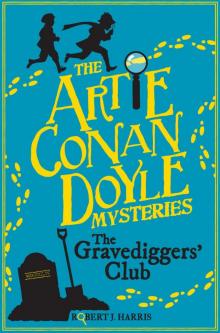 Artie Conan Doyle and the Gravediggers' Club
Artie Conan Doyle and the Gravediggers' Club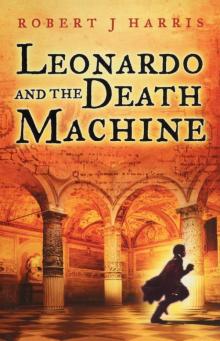 Leonardo and the Death Machine
Leonardo and the Death Machine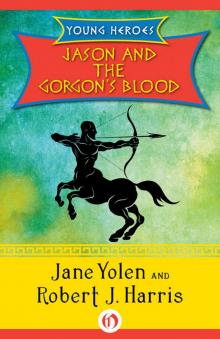 Jason and the Gorgon's Blood
Jason and the Gorgon's Blood Will Shakespeare and the Pirate's Fire
Will Shakespeare and the Pirate's Fire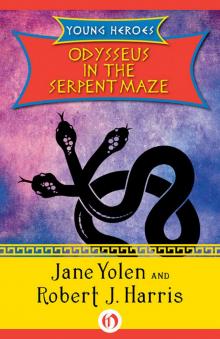 Odysseus in the Serpent Maze
Odysseus in the Serpent Maze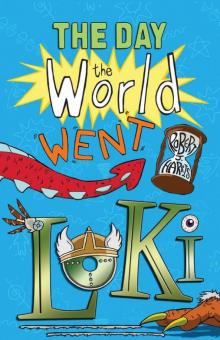 The Day the World Went Loki
The Day the World Went Loki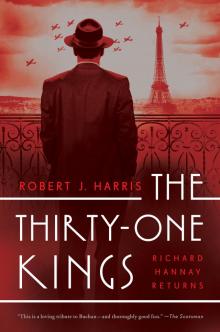 The Thirty-One Kings
The Thirty-One Kings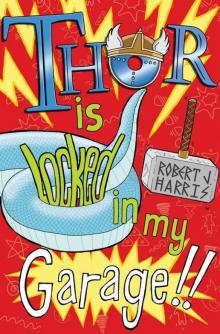 Thor Is Locked in My Garage!
Thor Is Locked in My Garage! Odin Blew Up My TV!
Odin Blew Up My TV!